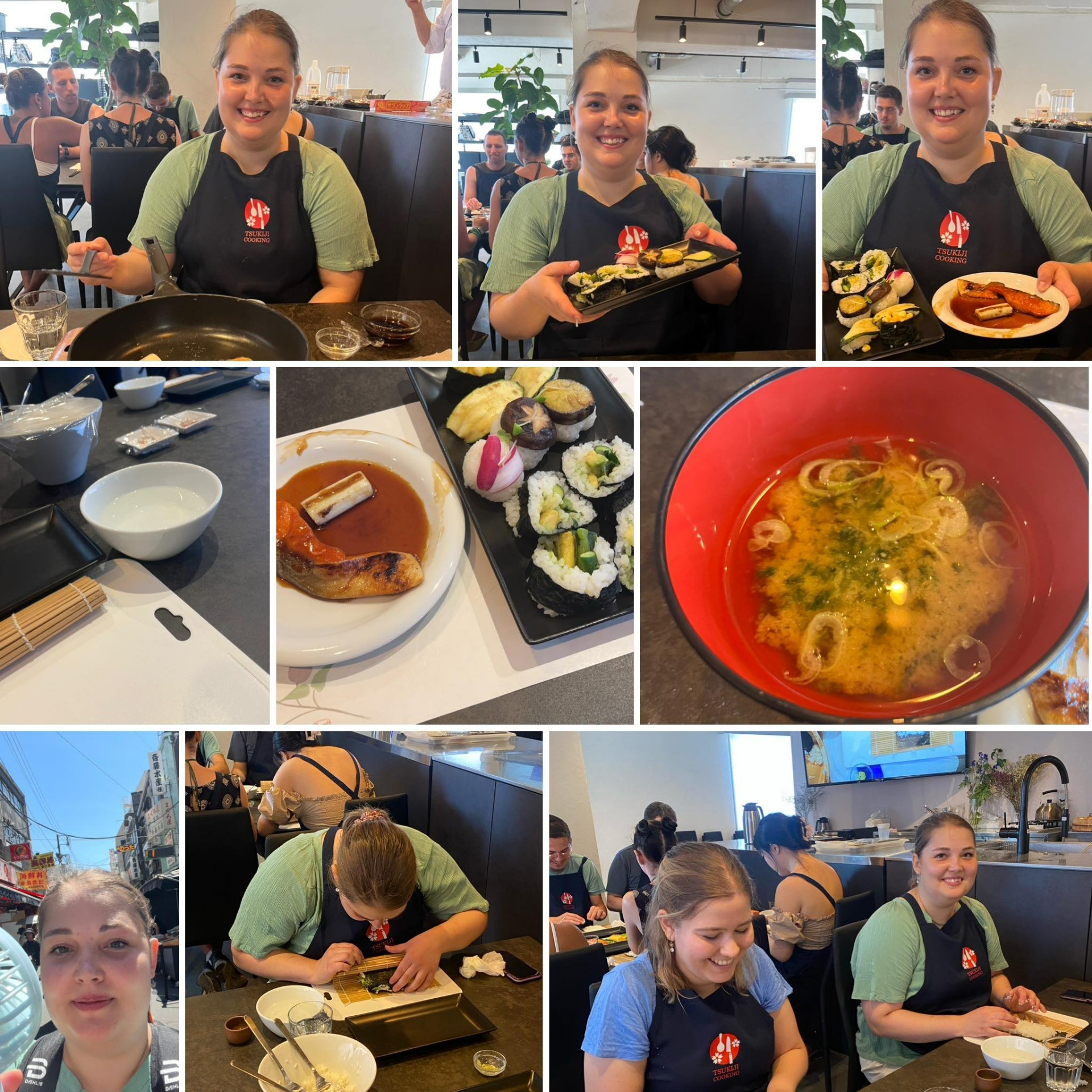Japan Day 4, Sushi, Shinjuku, and Tips for Travelers with Health Challenges

Traveling with a mental health condition, ADHD, autism, or a physical disability can feel daunting, but it can also be incredibly rewarding. Today in Tokyo reminded me why group travel, cultural immersion, and a supportive environment (including healthcare workers) make such a difference.
Morning: Sushi Class – Learning by Doing
After breakfast, our group caught the train to a bustling fish market for a sushi-making class. The day was hot, close to 40°C, so stepping into the cool building was a relief.
The chef spoke only Japanese, but an interpreter translated into English. He's been a sushi chef for 25 years. An assistant served drinks and made sure everyone felt comfortable. Since I'm not a fan of raw fish, I joined the vegetarian table with fresh vegetables and tofu.
Tip: If you have dietary restrictions or sensory sensitivities (common with autism or ADHD), let organizers know ahead of time. Most cultural classes, like sushi-making, are happy to adapt.
We watched the chef demonstrate each step, then tried it ourselves, classic "learning by doing." Most ingredients were prepped, so we only had to roll the rice and arrange the vegetables. At the end, we pan-fried either fish or tofu. Even as someone who doesn't like sauces, I loved the teriyaki glaze! The miso soup, made with soybeans, miso broth, vegetables, and herbs, was also delicious.
Midday: Exploring the Market and Shinjuku
After class, the group split up. Some browsed the fish market while others headed to Shinjuku, a vibrant Tokyo district.
One highlight was visiting the Hachiko statue, honoring the famously loyal dog who waited every day for his late owner.
Tip: Group travel is perfect for pacing yourself. If you need a sensory break or feel anxious, step out for a quiet moment, there's always someone nearby to reconnect with later.
We also visited a rooftop terrace overlooking the world-famous Shibuya pedestrian crossing. To access the terrace, you buy a drink, mine was an overly sweet cola. Watching hundreds of people cross from every direction was mesmerizing.
Tip for solo travelers in a group: Don't be afraid to start conversations with your group members while waiting for activities. Simple questions like, "What was your favorite part so far?" can break the ice and create friendships.
Evening: Skyline Views and Local Food
Next, we visited Tokyo's Governor Building for breathtaking skyline views. Arriving at sunset meant we saw Tokyo shift from daylight to neon glow, an unforgettable moment.
Tip: Schedule at least one activity that connects you deeply to a place—like a sunset view or a local food class. These moments become anchors in your memory, boosting mood and confidence.
Later, we explored Omoide Yokocho Alley, known historically as "Piss Alley" because of its old lack of restrooms. Today it's a lively street of tiny restaurants. A friend and I found a ramen shop with enormous portions, delicious and filling.
We wandered through Tokyo's red-light district and browsed multi-story shops before taking the train back to the hotel.
Why Group Travel and Support Matter
Build confidence: Managing the day's activities, trains, cooking, sightseeing, reminds you of your capabilities.
Learn culture firsthand: A sushi class isn't just about food, it's about patience, tradition, and respect.
Make connections: Shared experiences create friendships, even if you start the trip not knowing anyone.
Reduce stress with professionals nearby: Having a nurse, healthcare worker, or experienced guide on a trip means medical or emotional support is available if you need it.
Gain hope and perspective: Seeing a skyline at dusk or tasting ramen you've never tried can remind you life is bigger than today's struggles.
Extra Tips for Travelers with Mental or Physical Conditions
Communicate your needs early. Tell your travel organizer about dietary, sensory, or mobility considerations.
Use tools like PEGASUS strategies for ADHD, structure your day, and use reminders or checklists.
Pack comfort items. A small scarf, fidget tool, or calming playlist can help regulate anxiety.
Give yourself grace. Not every activity will be perfect, that's okay. Celebrate small victories.
Stay curious and respectful. Ask locals questions and learn a few phrases, it deepens cultural understanding and breaks down barriers.
Today in Tokyo was more than sushi and sightseeing, it was proof that travel can heal, teach, and connect. Whether you're managing ADHD, autism, depression, a physical condition, or recovery from addiction, the world is still open to you. Group travel, cultural learning, and supportive companions can turn fear into joy and isolation into community.